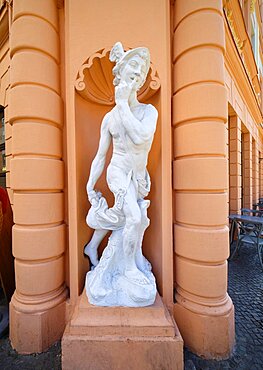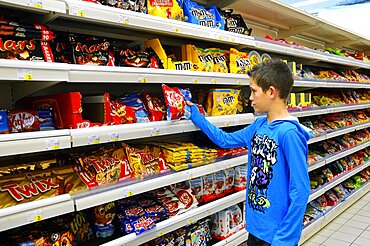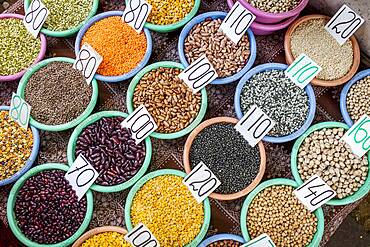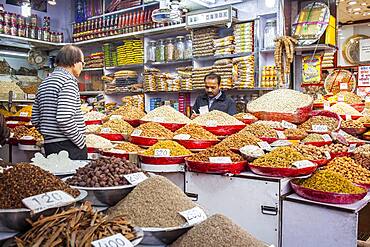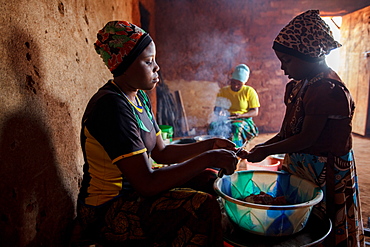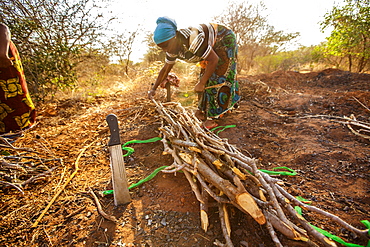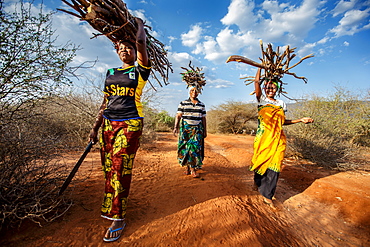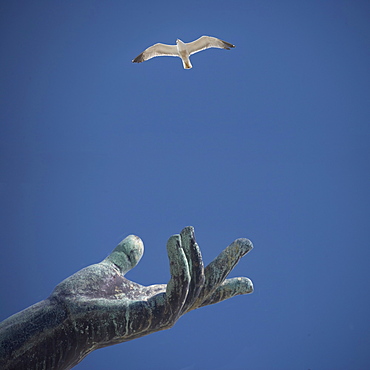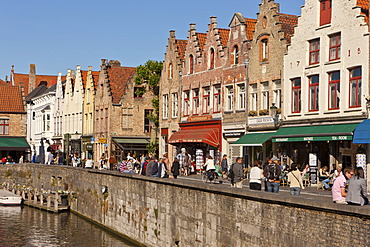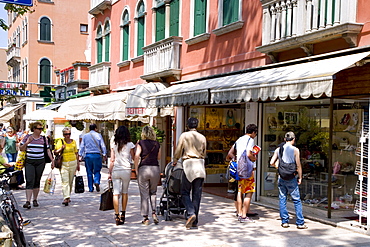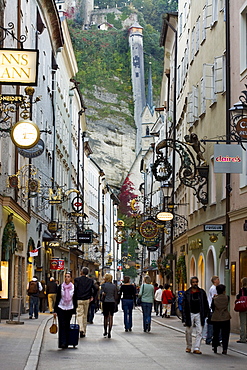Recent searches
Loading...
832-403843 - Top view ripped paper cyber monday clearance
832-403160 - Real estate agent shaking hand client holding keys
832-402121 - Happy female customer buying flowers from a gardener in a nursery inside the greenhouse
832-400390 - Happy black woman entrepreneur standing in plant store selling fresh flowers to client. Young blond girl buy a fresh bouquet from florist. Smiling african woman botanist, selling flowers
832-400021 - Multi-ethnic couple making online purchase with computer while having breakfast
832-398048 - Close-up of hands buying an ice cream. Close up of hands receiving an ice cream cone. Close up of person buying an ice cream cone
832-397269 - Statue of Hermes, patron god of travellers and merchants, Romanushaus, Leipzig, Saxony, Germany, Europe
832-396868 - Miniature house and laptop computer resting on desktop
1178-41563 - Eye of Caucasian woman examining blouse
1339-9 - Books for purchase in Plaza de Armas, Havana, Cuba, West Indies, Central America
1178-32506 - Mixed Race cashier ringing up groceries
832-392875 - Woman signing real estate contract papers holding small model home in front
832-392874 - Woman signing real estate contract papers holding house keys and home keychain with small model home in front
832-392873 - Woman signing real estate contract papers with small model home in front
832-392872 - Man signing real estate contract papers and reaching for small model home in front
832-392871 - Real estate agent and customer sign contract papers and shake hands with small model home in front
832-392878 - Man signing real estate contract papers with small model home in front
832-392876 - Real estate agent and customer sign contract papers with house keys and small model home in front
1350-1643 - woman and man selling flowers for the puja ceremony in Dashashwamedh ghat, Varanasi, Uttar Pradesh
1350-1646 - The flower market,Varanasi, Uttar Pradesh, India
1350-987 - Spice market, in Khari Baoli, near Chandni Chowk, Old Delhi, India
1350-1648 - The flower market,Varanasi, Uttar Pradesh, India
1350-1493 - Paintings, Sunday evening market or walking street, Chiang Mai, Thailand
1350-1644 - Main Market, Historical Center, near Dashashwamedh Ghat Road , Varanasi, Uttar Pradesh
1350-1647 - The flower market,Varanasi, Uttar Pradesh, India
1350-1226 - Customers and seller haggling, souk of brass, Place as Seffarine, medina. Fez.Morocco
1350-1645 - Spice shop, main bazaar,Historical Center, near Dashashwamedh Ghat Road , Varanasi, Uttar Pradesh
1350-986 - Spices on display, Spice market, in Khari Baoli, near Chandni Chowk, Old Delhi, India
1350-988 - Spice market, in Khari Baoli, near Chandni Chowk, Old Delhi, India
1348-595 - Senior woman receiving medicines bought on internet.
1348-594 - Senior woman receiving medicines bought on internet.
832-389071 - Day labourer in front of a butcher's shop in a market in the centre of Chongqing, from his wages he can only buy the cheap pieces of meat, Chongqing, China, Asia
832-389073 - Worker having lunch at a stall in a market in the center of Chongqing, from his wages he can only buy the cheap pieces of meat, Chongqing, China, Asia
832-385958 - Woman writes Japanese characters, calligraphy, lucky charms to buy in Todaiji Temple, Japan, Nara, Japan, Asia
1116-39870 - People lined up outside a vendor's stall to make a purchase, Jaipur, Rajasthan, India
857-94727 - Mforo, Tanzania a village near Moshi, Tanzania. Solar Sister entrepreneur Fatma Mziray and her eldest daughter Zainabu Ramadhani, 19 cook lunch in her kitchen house using both a clean cookstove using wood and one using coal. One of her younger daughters, Nasma Ramadhani, age 5 helps out. Fatma Mziray is a Solar Sister entrepreneur who sells both clean cookstoves and solar lanterns. Fatma heard about the cookstoves from a Solar Sister development associate and decided to try one out. The smoke from cooking on her traditional wood stove using firewood was causing her to have a lot of heath problems, her lungs congested her eyes stinging and her doctor told her that she had to stop cooking that way. Some days she felt so bad she couldn't go in to cook. Fatma said, âCooking for a family, preparing breakfast, lunch and dinner I used to gather a large load of wood every day to use. Now with the new cook stove the same load of wood can last up to three weeks of cooking. âWith the extra time I can develop my business. I also have more time for the family. I can monitor my childrenâs studies. All of this makes for a happier family and a better relationship with my husband. Since using the clean cookstove no one has been sick or gone to the hospital due to flu.â Fatma sees herself helping her community because she no longer sees the people that she has sold cookstoves have red eyes, coughing or sick like they used to be. She has been able to help with the school fees for her children, purchase items for the home and a cow. âWhat makes me wake up early every morning and take my cookstoves and go to my business is to be able to take my family to school as well as to get food and other family needs.â
857-94726 - Zainabu Ramadhani, 19, (yellow and red patterned skirt) her mother Fatma Mziray, age 38, (blue head dress) and Fatmaâs sister-in-law Zaitun Hamad, 18, (orange wrap and white top) walk home after gathering firewood near Fatmaâs home in Mforo. Mforo is near Moshi, Tanzania. Fatma Mziray is a Solar Sister entrepreneur who sells both clean cookstoves and solar lanterns. Fatma heard about the cookstoves from a Solar Sister development associate and decided to try one out. The smoke from cooking on her traditional wood stove using firewood was causing her to have a lot of heath problems, her lungs congested her eyes stinging and her doctor told her that she had to stop cooking that way. Some days she felt so bad she couldn't go in to cook. Fatma said, âCooking for a family, preparing breakfast, lunch and dinner I used to gather a large load of wood every day to use. Now with the new cook stove the same load of wood can last up to three weeks of cooking. âWith the extra time I can develop my business. I also have more time for the family. I can monitor my childrenâs studies. All of this makes for a happier family and a better relationship with my husband. Since using the clean cookstove no one has been sick or gone to the hospital due to flu.â Fatma sees herself helping her community because she no longer sees the people that she has sold cookstoves have red eyes, coughing or sick like they used to be. She has been able to help with the school fees for her children, purchase items for the home and a cow. âWhat makes me wake up early every morning and take my cookstoves and go to my business is to be able to take my family to school as well as to get food and other family needs.â
857-94728 - Zainabu Ramadhani, 19, (yellow and red patterned skirt) her mother Fatma Mziray, age 38, (blue head dress) and Fatmaâs sister-in-law Zaitun Hamad, 18, (orange wrap and white top) walk home after gathering firewood near Fatmaâs home in Mforo. Mforo is near Moshi, Tanzania. Fatma Mziray is a Solar Sister entrepreneur who sells both clean cookstoves and solar lanterns. Fatma heard about the cookstoves from a Solar Sister development associate and decided to try one out. The smoke from cooking on her traditional wood stove using firewood was causing her to have a lot of heath problems, her lungs congested her eyes stinging and her doctor told her that she had to stop cooking that way. Some days she felt so bad she couldn't go in to cook. Fatma said, âCooking for a family, preparing breakfast, lunch and dinner I used to gather a large load of wood every day to use. Now with the new cook stove the same load of wood can last up to three weeks of cooking. âWith the extra time I can develop my business. I also have more time for the family. I can monitor my childrenâs studies. All of this makes for a happier family and a better relationship with my husband. Since using the clean cookstove no one has been sick or gone to the hospital due to flu.â Fatma sees herself helping her community because she no longer sees the people that she has sold cookstoves have red eyes, coughing or sick like they used to be. She has been able to help with the school fees for her children, purchase items for the home and a cow. âWhat makes me wake up early every morning and take my cookstoves and go to my business is to be able to take my family to school as well as to get food and other family needs.â
857-94729 - Zainabu Ramadhani, 19, (yellow and red patterned skirt) her mother Fatma Mziray, age 38, (blue head dress) and Fatmaâs sister-in-law Zaitun Hamad, 18, (orange wrap and white top) walk home after gathering firewood near Fatmaâs home in Mforo. Mforo is near Moshi, Tanzania. Fatma Mziray is a Solar Sister entrepreneur who sells both clean cookstoves and solar lanterns. Fatma heard about the cookstoves from a Solar Sister development associate and decided to try one out. The smoke from cooking on her traditional wood stove using firewood was causing her to have a lot of heath problems, her lungs congested her eyes stinging and her doctor told her that she had to stop cooking that way. Some days she felt so bad she couldn't go in to cook. Fatma said, âCooking for a family, preparing breakfast, lunch and dinner I used to gather a large load of wood every day to use. Now with the new cook stove the same load of wood can last up to three weeks of cooking. âWith the extra time I can develop my business. I also have more time for the family. I can monitor my childrenâs studies. All of this makes for a happier family and a better relationship with my husband. Since using the clean cookstove no one has been sick or gone to the hospital due to flu.â Fatma sees herself helping her community because she no longer sees the people that she has sold cookstoves have red eyes, coughing or sick like they used to be. She has been able to help with the school fees for her children, purchase items for the home and a cow. âWhat makes me wake up early every morning and take my cookstoves and go to my business is to be able to take my family to school as well as to get food and other family needs.â
1167-1300 - Customer pays for purchase, busy fish stall in winter, Pescheria, Rialto Market, Venice, UNESCO World Heritage Site, Veneto, Italy, Europe
1167-1104 - Shoppers make purchase at Omicho fresh food market, busy and colourful covered streets lined by stalls, Kanazawa, Japan, Asia
1167-1093 - Shopper with basket considers purchase at local Japanese food stall, Nishiki Market (Kyoto's Kitchen), Downtown Kyoto, Japan, Asia
857-91073 - November 7, 2008 Mt Shasta CA A spawned-out Chinook salmon watches over her redd in the Shasta River where it runs through Big Springs Ranch about 2 miles north of the town of Mt Shasta. The ranch, which is contributing to degraded habitat conditions, which actually warm water tempt by upwards of 10 degrees as the river passes through the ranch and then spills into the Klameth, is currently under contract for purchase by TNC, therefor TNC and partner organizations have been allowed to research this stretch of river for the first time. They have discovered that is it a very fertile juvenile rearing area and that there are a surprising number of returning salmon in spite of habitat degraded by grazing cattle (often in the river) and irrigation practices. If this purchase is successful, TNC has the chance to improve a large stretch of habitat and quickly improve conditions that will effect numbers of returning fish and habitat in the Shasta and Klameth Rivers. In California, The Nature Conservancy is focusing its efforts on protecting the Shasta River and its tributaries, which create one of the most important spawning nurseries for Chinook salmon in the entire Klamath Basin, United States of America
857-91077 - November 12, 2008 Mt Shasta CA, Big Springs ranch Carson Jeffres (rt) Staff Research Associate for UC Davis Center for watershed Sciences, and Andrew Nichols, Jr Specialist (UC Davis Center for watershed Sciences,) conducting research in the Shasta River where it runs through Big Springs Ranch about 20 miles north of the town of Mt Shasta. The ranch, which is contributing to degraded habitat conditions that warm water temps by upwards of 10 degrees as the river passes through the ranch and then spills into the Klameth, is currently under contract for purchase by TNC, therefor TNC and partner organizations have been allowed to research this stretch of river for the first time. They have discovered that is it a very fertile juvenile rearing area and that there are a surprising number of returning salmon in spite of habitat degrated by grazing cattle (often in the river) and irrigation practices. If this purchase is sucessful, TNC has the chance to improve a large stretch of habitiat and qucikly improve conditions that will effect numbers of returning fish and habitiat in the Shasta and Klameth Rivers. The Shasta River and its tributaries create one of the most important spawning nurseries for Chinook salmon in the entire Klamath Basin, United States of America
857-91084 - Mt Shasta CA, Big Spring Ranch Bill Chesney from the CA Dept of Fish & Game counting redds in a stretch of river that is heavily grazed by cattle who have full access to the river and often drink and eat in it. Mt Shasta in the background. The Shasta River runs through Big Springs Ranch about 20 miles north of the town of Mt Shasta. The ranch, which is contributing to degraded habitat conditions, and actually warming water temps by upwards of 10 degrees as the river passes through the ranch and then spills into the Klameth, is currently under contract for purchase by TNC. Since the contract began, TNC and partner organizations have been allowed to research this stretch of river for the first time. They have discovered that is it a very fertile juvenile rearing area and that there are a surprising number of returning salmon in spite of habitat degradation by grazing cattle (often in the river) and irrigation practices. If this purchase is successful, TNC has the chance to improve a large stretch of habitat and quickly improve conditions that will effect numbers of returning fish and habitat in the Shasta and Klameth Rivers. The Shasta River and its tributaries create one of the most important spawning nurseries for Chinook salmon in the entire Klamath Basin, United States of America
857-91074 - November 7, 2008 Mt Shasta CA A spawned-out Chinook salmon watches over her redd in the Shasta River where it runs through Big Springs Ranch about 2 miles north of the town of Mt Shasta. The ranch, which is contributing to degraded habitat conditions, which actually warm water tempt by upwards of 10 degrees as the river passes through the ranch and then spills into the Klameth, is currently under contract for purchase by TNC, therefor TNC and partner organizations have been allowed to research this stretch of river for the first time. They have discovered that is it a very fertile juvenile rearing area and that there are a surprising number of returning salmon in spite of habitat degraded by grazing cattle (often in the river) and irrigation practices. If this purchase is successful, TNC has the chance to improve a large stretch of habitat and quickly improve conditions that will effect numbers of returning fish and habitat in the Shasta and Klameth Rivers. In California, The Nature Conservancy is focusing its efforts on protecting the Shasta River and its tributaries, which create one of the most important spawning nurseries for Chinook salmon in the entire Klamath Basin, United States of America
832-371445 - Historic Centre with guild houses at Rozenhoedkaai, Quai of the Rosary, historic town centre of Bruges, UNESCO World Heritage Site, West Flanders, Flemish Region, Belgium, Europe
832-377792 - Young woman on a shopping spree in the city
832-373068 - Woman jumping with shopping bags, joyful leap
832-368660 - Souk, bazar of Damascus, Unesco World Heritage Site, Syria, Middle East, West Asia
832-377989 - Kurti and saris stacked for sale, Jodhpur, Rajasthan, India, Asia
832-377777 - Young woman on a shopping expedition in the city
832-372814 - Tourists in front of stalls with pictures of the fortress of Akkerman in Bilhorod-Dnistrowskyj, Ukraine, Eastern Europe
1167-494 - Morning purchase at the fish stall, Pescheria, Rialto Markets, San Polo, Venice, UNESCO World Heritage Site, Veneto, Italy, Europe
832-352309 - Window dummies in front of a shop in the historic centre of Dalt Villa, Ibiza, Balearic Islands, Spain, Europe
832-341682 - View into the big store Lafayette, Paris, France
832-341552 - Apples on a supermarket scale (produce scale)
832-351614 - Shops on the main street Gran Viale, Lido, Venice, Venetian Lagoon, Italy, Europe
832-352147 - Candy store at the Old Market, Salzburg, Salzburger Land, Austria, Europe
832-351822 - Venice-souvenirs in a shop, Venice, Veneto, Italy, Europe
832-344085 - Jewelry stores at Ponte Vecchio, Florence, Firenze, Tuscany, Italy, Europe
832-346359 - Woman on the way to floating market, Banjarmasin, South-Kalimantan, Borneo, Indonesia
832-345047 - Gucci coat of arms behind a male mannequin in the window display of the Gucci fashion boutique on the Maximilianstrasse, Munich, Bavaria, Germany
832-351587 - Umbrellas made of bobbin lace in a bobbin lace shop, Burano, Lagoon, Venice, Italy, Europe
832-343873 - Matrjoschkas, also doll in the doll, Russian doll or falsely Babuschka, Riga, Latvia, Baltic region, Europe
832-342388 - Clay pots sold at a street market in Chichicastenango, Guatemala, Central America
832-348303 - Pedestrian zone, Albufeira, Algarve, Portugal
832-341433 - City Point department store, decorated for Christmas, shopping center, escalator, Nuremberg, Middle Franconia, Bavaria, Germany, Europe
832-352122 - Getreidegasse alley, Salzburg, Austria, Europe
832-352187 - Suria KLCC, shopping centre in the Petronas Twin Towers, Kuala Lumpur, Malaysia, Southeast Asia
832-345043 - Shop window, Van Laak fashion boutique on the Residenzstrasse, Munich, Bavaria, Germany
832-346361 - Floating market near Banjarmasin, South-Kalimantan, Borneo, Indonesia
832-346364 - Woman on the way to floating market, Banjarmasin, South-Kalimantan, Borneo, Indonesia









